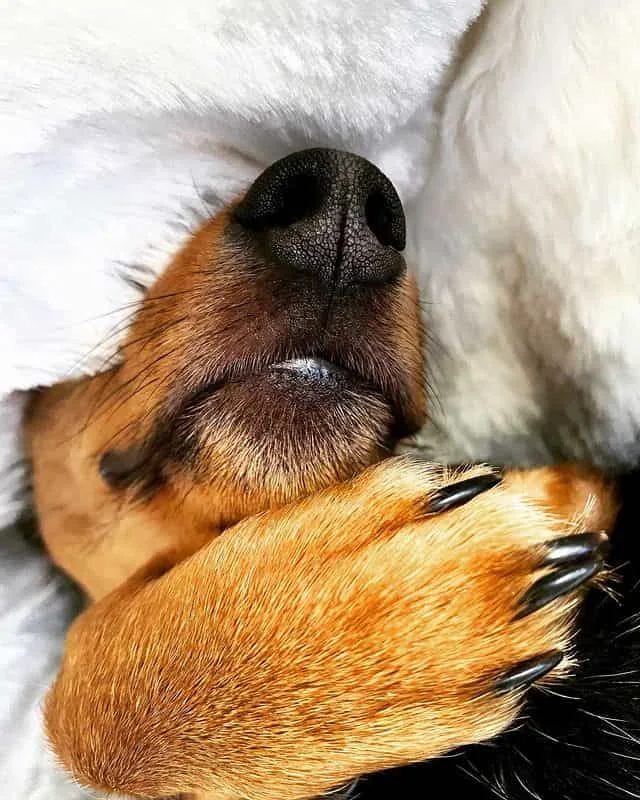Normally, dog nasal discharge can be due to simple excitement, however, it can also be due to other health problems, such as cancer in dogs.
Causes, symptoms and treatment of dog runny nose
Normally, dog runny nose is not usually a symptom of major gravity! However, if this discharge persists, or has other symptoms such as:
- Yellow discharge
- Green
- Foul smelling
The best thing to do would be to take your furry companion to the vet, he will be able to give you the best diagnosis!
The most common causes of dog runny nose are usually:
Allergies
In case your dog's nasal discharge is clear, it is possible that it is caused by an allergy.
Just like us, dogs can be allergic to certain foods, medicines, expensive drugs, pollen, fungi... They can also be allergic to human dander!
Symptoms of allergy in dogs
They are usually:
- Runny nose
- Sneezing
- Coughing
- Itching
- Nosebleeds
- Breathing problems
What can you do? If your dog's runny nose is caused by an allergy, the best thing to do is to try to avoid what is causing the allergy. Do not hesitate to talk to your veterinarian, he will be able to perform certain allergy tests on your pet, and also prescribe a treatment with antihistamines.
Blockage in the nostrils
Sometimes, dog nasal discharge is a symptom that there is "something" trapped in your pet's nose. It can be anything! A seed, a leaf, a feather?
The most frequent symptoms are:
- Sneezing
- Itchy nose (causing your pet to scratch)
- Bleeding from the nose
If you see that your pet has something in his nose, you can try to remove it very carefully using tweezers. If you don't feel comfortable (remember that dogs' noses can bleed a lot), don't hesitate to call your veterinarian. In that case, he may choose to sedate your dog to remove the clog from his nose. He will possibly prescribe an antibiotic as well, to prevent infection.
Infection
If your dog has mucus or pus discharge, bleeding, coughing and even choking... he could have an infection!
- Bacterial
- Mycotic (or fungal)
- Viral
In this case, treatment will depend very much on the cause of the infection. If it is a bacterial infection, the veterinarian will probably prescribe antibiotics. If he has a fungal infection, he will require antifungal treatment. On the other hand, if he has a chronic infection, his case may require surgery.
If your dog has nasal polyps or tumors
The most frequent symptoms of nasal polyps or tumors are usually: mucus, pus, noisy breathing, lumps on one side of the nose, decreased appetite...
These cases usually require surgical intervention, since in most cases, they recur.
- If it is a benign tumor: it can be removed surgically.
- In the case of malignant (or cancerous) tumors: your dog would need radiation treatment (in these cases, surgical removal is not usually successful).
Problems in the nostrils
Some dog breeds are more prone to runny noses. Dogs that have a flat face, and dogs with soft and flexible nose cartilage, are the most likely to have this problem!
In the case of dogs with very small nostrils, surgery may be recommended. This type of intervention is usually delayed until the small furry dog is an adult.
If your dog has problems in his nostrils, it is very possible that his breathing is very noisy.
Distemper
When a dog has distemper, it will secrete a yellowish, sticky mucus. Other common symptoms include fever, pneumonia, spasms and convulsions.
Depending on the symptoms your pet may be prescribed antibiotics, anticonvulsants, sedatives and painkillers. However, the best treatment for distemper is... Prevention! That is to say, to follow the vaccination plan.
Cleft palate or fistula
If the discharge occurs after eating, it could be a symptom of this disease:
Cleft palate in dogs: the two sides of the palate do not fuse.
Oral-nasal fistula: there is a hole between the nose and the mouth (this is usually the consequence of a tooth decay, injury and/or infection).
Normally in this type of case, treatment usually requires surgery.
How to stop a nosebleed in a dog
As we have just seen... there are many possible causes of nosebleeds in dogs! However, the moment it happens, what we want to do is try to stop the bleeding.
- Try to calm your dog
- Cover the bleeding hole with gauze or absorbent cotton.
- Put a gauze pad, compress or cold cloth on the top of your dog's nose.
- Do not tilt your dog's head
If your dog's nosebleed does not stop within a few minutes, call your veterinarian!
How to care for your dog's nose
Although it has always been popularly thought that dogs' noses should be moist and cool, this is not true! A dog that is sick can have a nose that is hot, cold, wet or dry.
It is best to observe your dog's nose when he is healthy, so you can detect changes!
When examining your dog's nose, try to look for unusual symptoms such as discharge or blood. You may also want to look for a dry, crusty or pale nose.
Remember! If your dog's breathing sounds more than usual, it could be a symptom of respiratory problems!
As you have seen, dog runny nose can have many causes! The best thing to do is to have your veterinarian do a quick examination.



